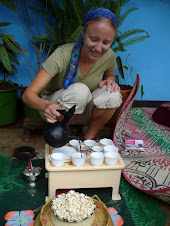In the midst of all the delicious novelty, life here has organized itself into a series of comfortable routines.
I wake up in the morning and go for a run in the countryside just beyond my edge of town. At
Two days a week, I ride the neon green 18-speed across town to KB's house for meetings with our Amharic tutor. We struggle to discern the incredibly complex grammatical patterns underlying the Amharic language and wonder at least once during each session if we will ever be able to speak beyond the level of an Ethiopian five-year-old. Meanwhile, pantsless, dirt-covered, two-year-old Abi presses his face against the large front window to stare in at us, wondering when it will finally be time to play.
During these meetings, I leave the 18-speed at the local kebele office on the main road, so as not to endure the trial of dragging it down the steep, unridable hill to KB's house and back up again. Occasionally, I'll decide to spend the night on KB's couch, meaning the 18-speed stays overnight inside the kebele compound. The first time I did this, I had a brief moment of dread when I arrived the next morning to see a large pile of construction debris where my bike had been chained to the building. As office workers rushed to remove rusty sheets of corrugated tin and splintering wooden logs piece-by-piece from the haphazard heap, however, I saw the neon glow of the 18-speed emerge from underneath and realized that the heap had been assembled as a protective shelter.
The rest of my workdays are spent in talking to the directors of various local organizations and observing their programs. I am steadily gaining a clearer picture of this "network of HIV/AIDS response" inside of which I am expected to "serve as a link" and "identify gaps". I am also getting the picture that, over the next two years, I will be called upon to edit (read: completely redraft) many awkward and often incomprehensible project proposals written in non-native English in order to court foreign donors.
Shopping, once a daunting exercise in navigating innumerable stores and stalls and haggling down inflated farenji prices, has also settled into a manageable routine now that KB and I have established our "dembegnas" (the vendors of whom we are regular customers, who treat us generously in return). There is the seller of household items who will not let us escape without first having tea and bread. There is the seller of kitchen utensils who likes to talk to me about his side career as a writer (and who also will not let us escape without first having tea and bread). There is the store owner from whom we always buy peanut butter, who now has jars ready in hand before we even make it up to his counter. There is the store owner who always gives us free UAE-imported chocolates. There is our vegetable woman in the market (also KB's neighbor) who, rather than selling us items from the palette displayed in front of her, reaches into the sacks kept behind her for the VIP vegetables. And finally, there is the highlight of my Debremarkos experience, a small dry goods store stocked with tall sacks of flours, grains, legumes, dried chiles, and fresh spices of all varieties – and felicitously staffed by a kindly old man and his rather attractive son. For a young Southern girl who loves to cook, there's just something about a handsome foreign man surrounded by the smells of cinnamon and coriander…
Even some of our personal interactions with the community have taken on an air of the routine. We proceed effortlessly in Amharic through the same series of questions asked by everyone in greeting. (How are you? Are you fine? Is it good? Is it selam [peace]? How is Debremarkos? Have you adjusted? The weather condition, does it suit you?
"You see, he thinks he knows everything about Debremarkos. He told me so."
"No, I did not say so."
"You DID say so!"
"No, I did not say so. I do not know everything. I only know myself."
"You do not EVEN know yourself."
"I do."
"How can you ever truly know yourself? How is it possible?"
"I do. At least 50 percent."
"Where is the scientific research you have done on this point?"
"I know more than YOU."
"Ara! This man is a liar!"
"I am no liar! In fact you cannot compete with me in any aspect. I will beat you in a footrace! I will even give you ten meters of head start. I tell you, you cannot compete with me! Now why don't you pay for our tea?"
"Ara! Do you see how this man exploits me?"
"No, this man is rich! He has much money, and I have only my big stomach!"
"I have been trying to explain to this man that if I had so much money, I would put it in a bank. But as it is, I have no account."
"This man lies! He keeps his money hidden in his home! He takes all his much money and digs a hole and puts into the ground! One night I will go while he sleeps to his home and find and take his much money!"
"This man speaks very may words, and yet he pays for very little tea. He has not the expense to cover his many words."
"Talk is cheap! Ha-HA!"
"Socrates [pronounced Soh-krayts] has said, '
In a country half a world away from home, in a culture still largely unfamiliar, amongst people I have only just begun to know, it is assuring to be able to call anything "routine". Though this place still delivers daily the promise and thrill of new adventures, its growing familiarity gives it the air of home.
